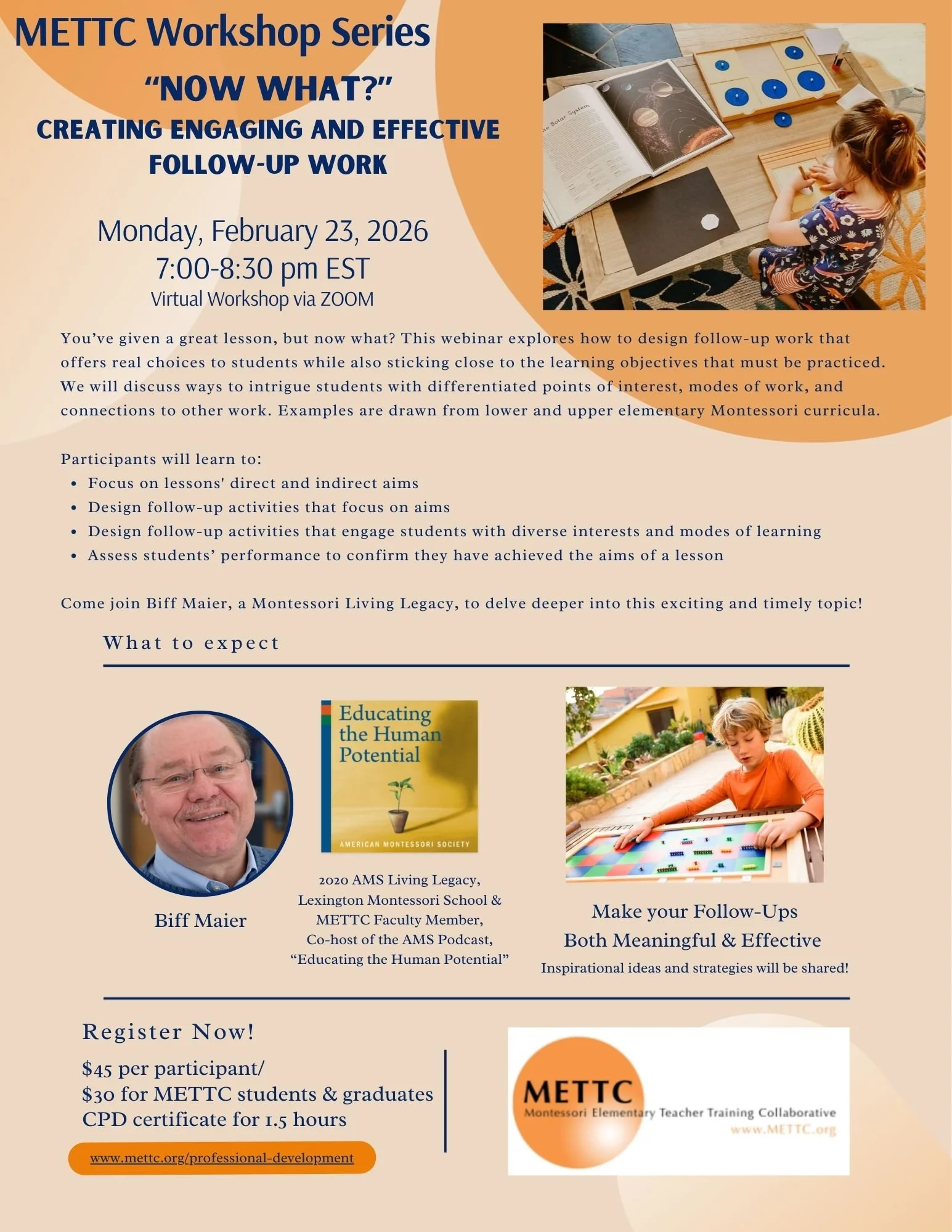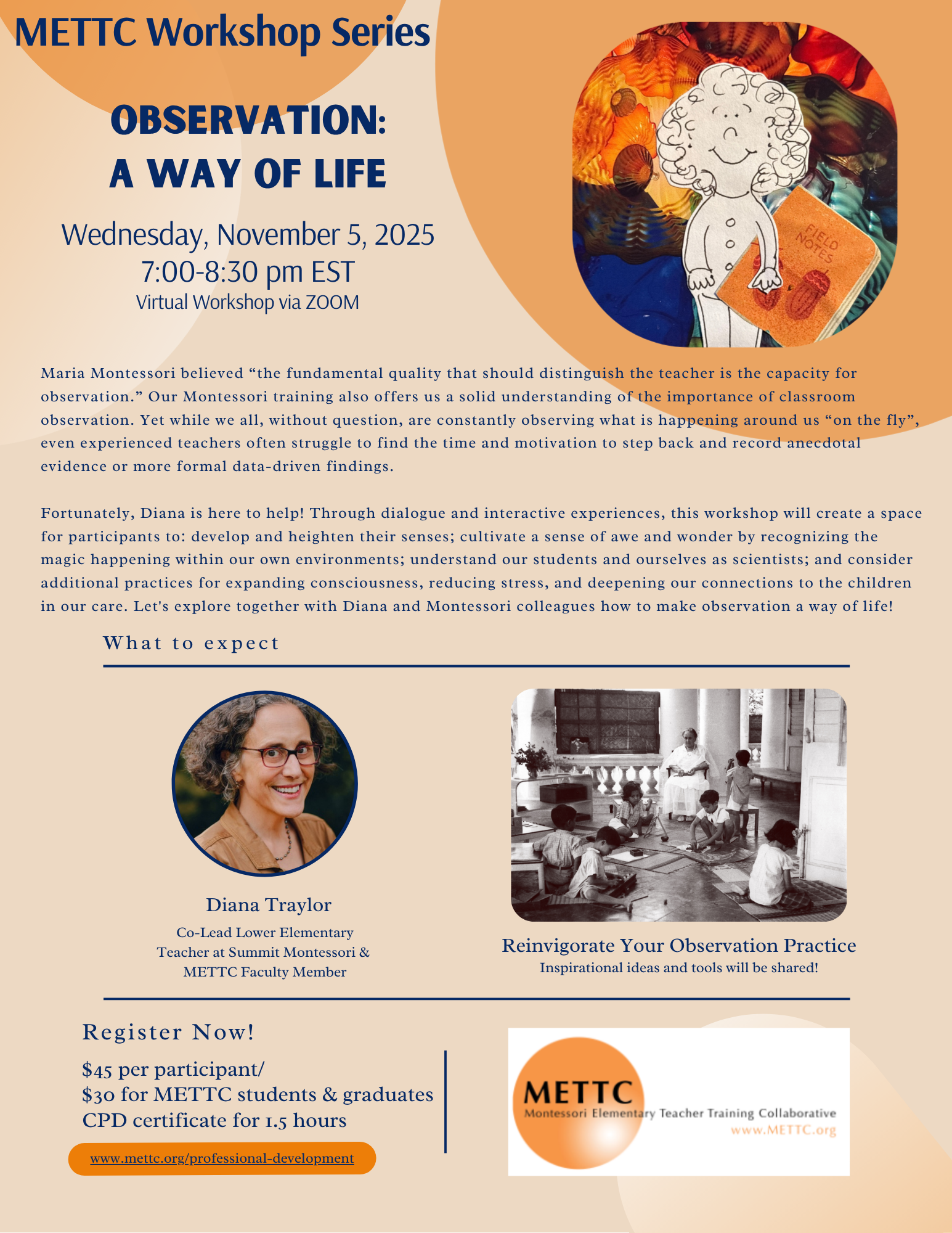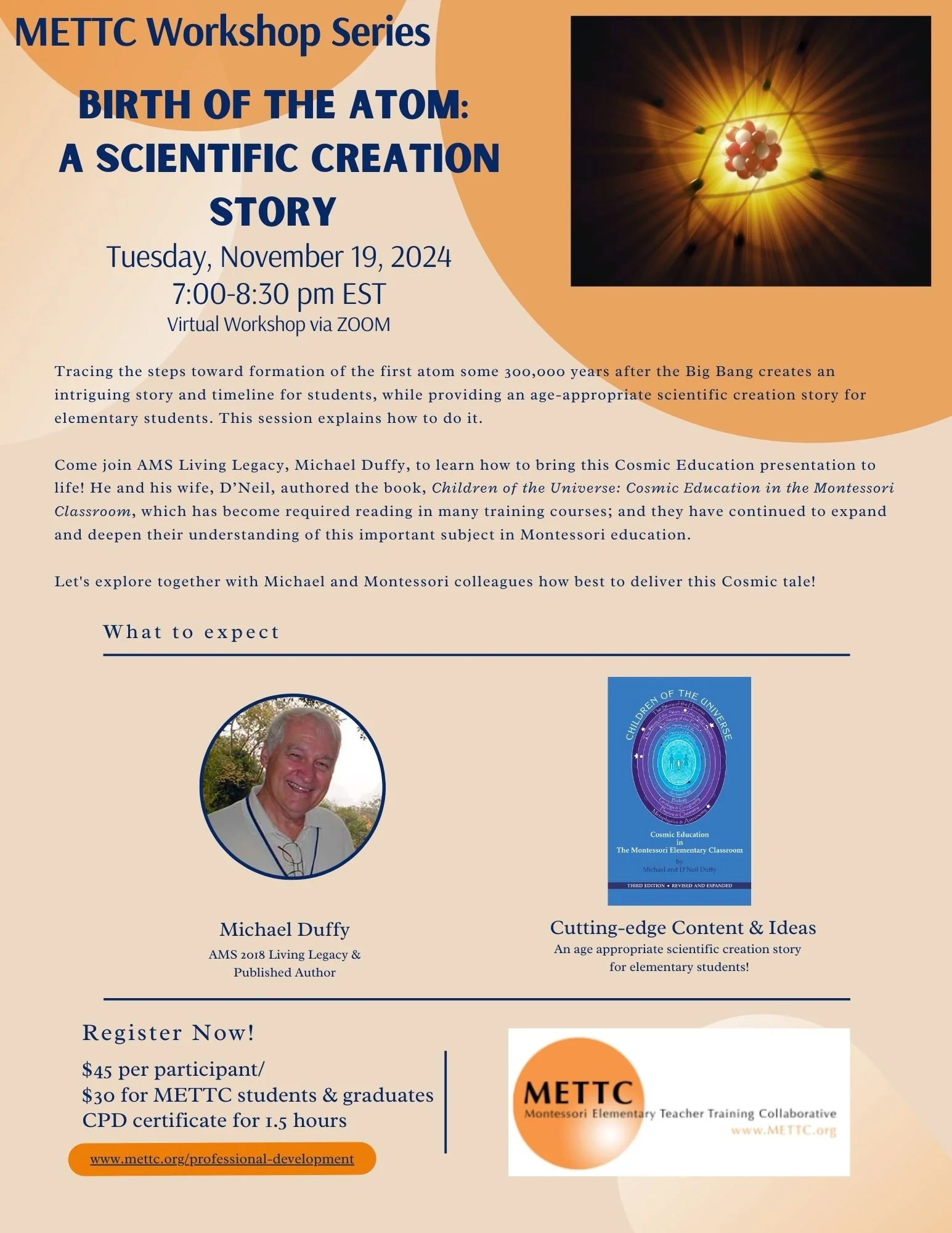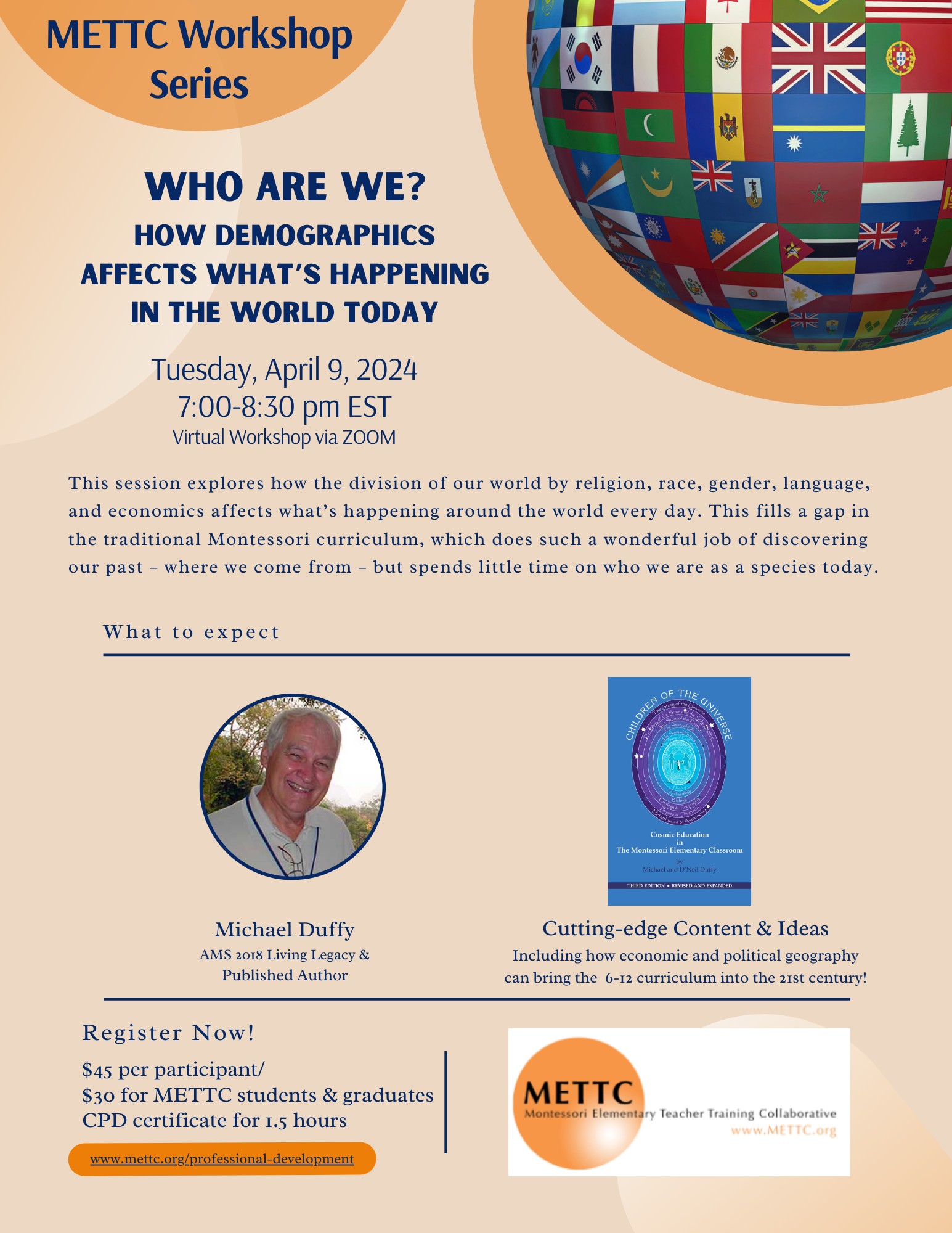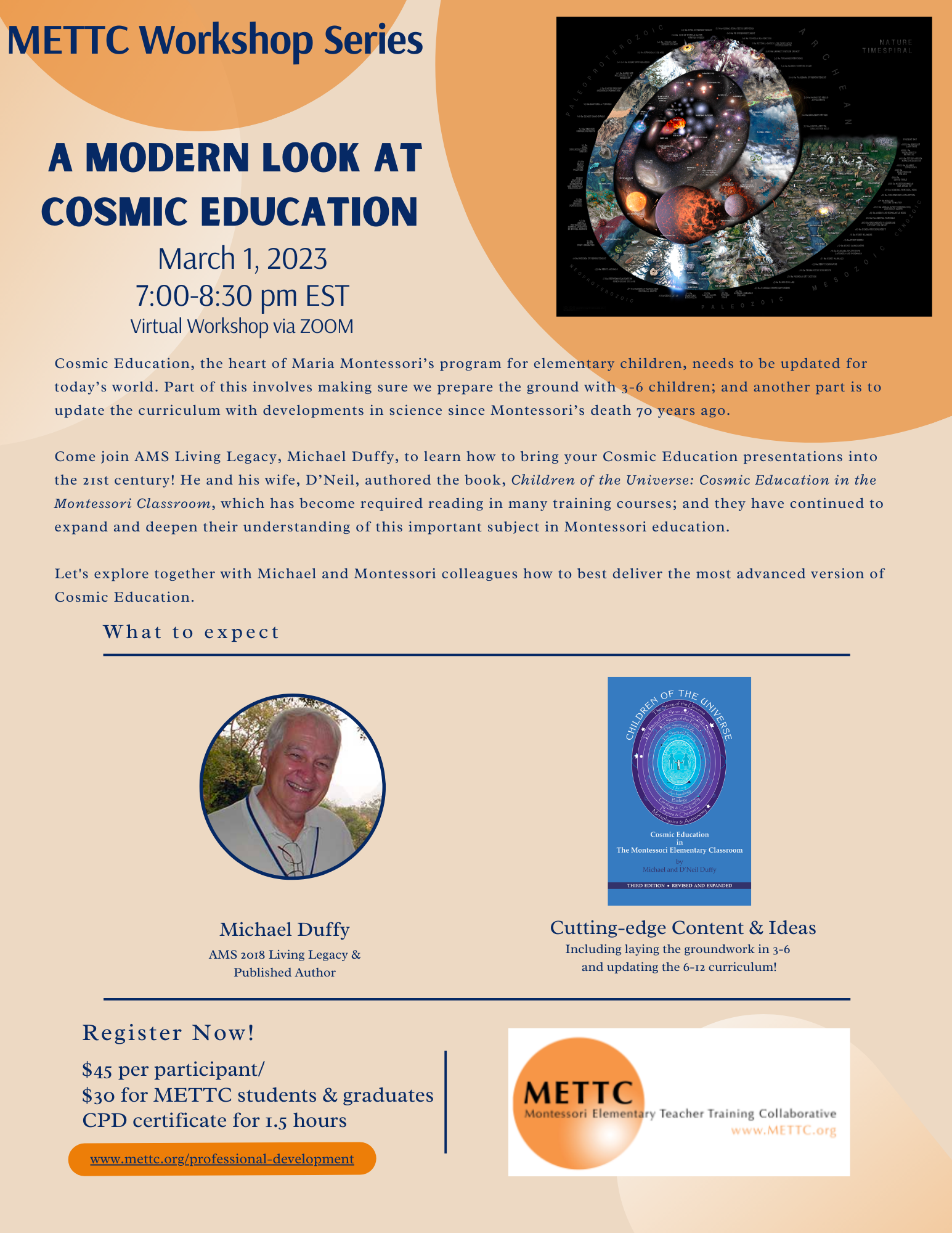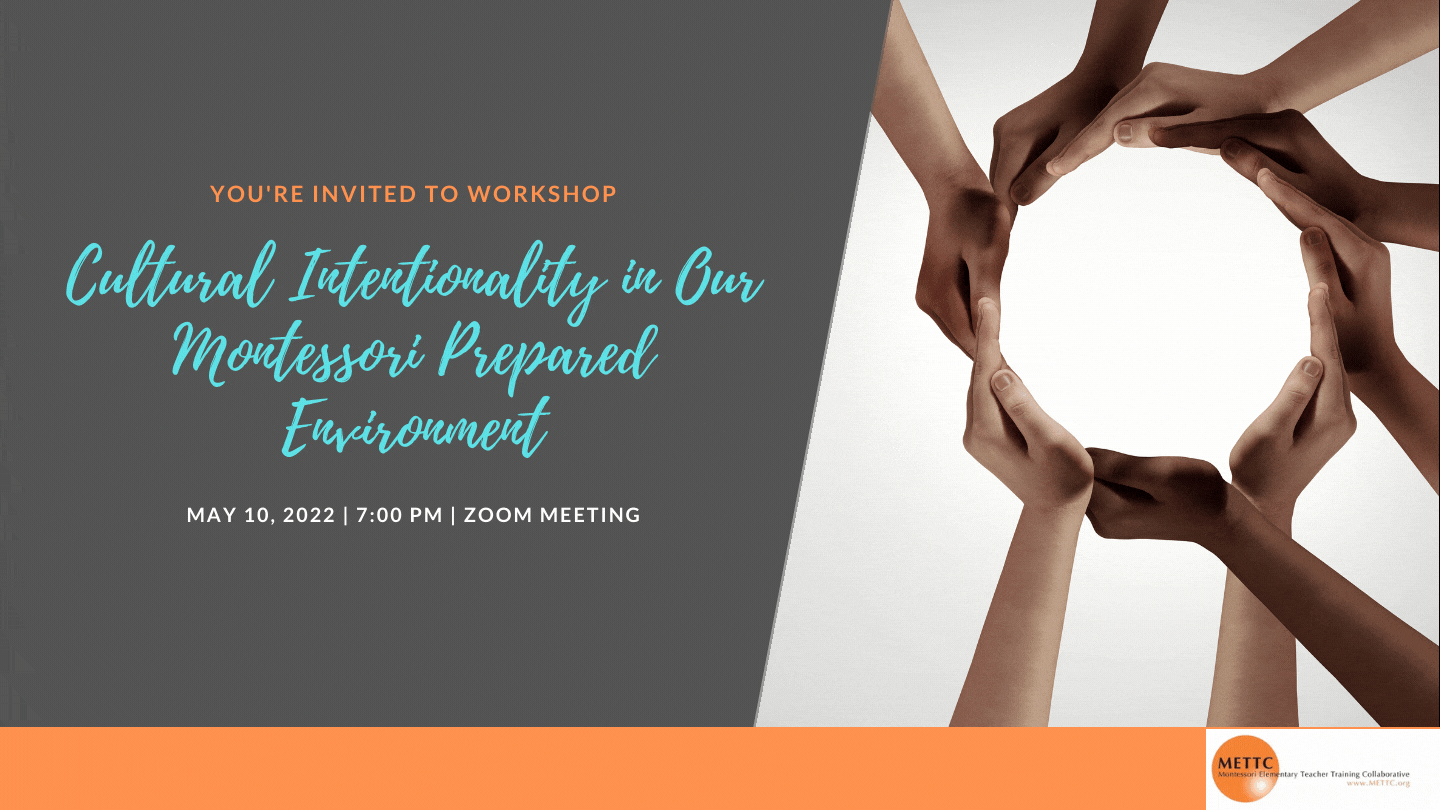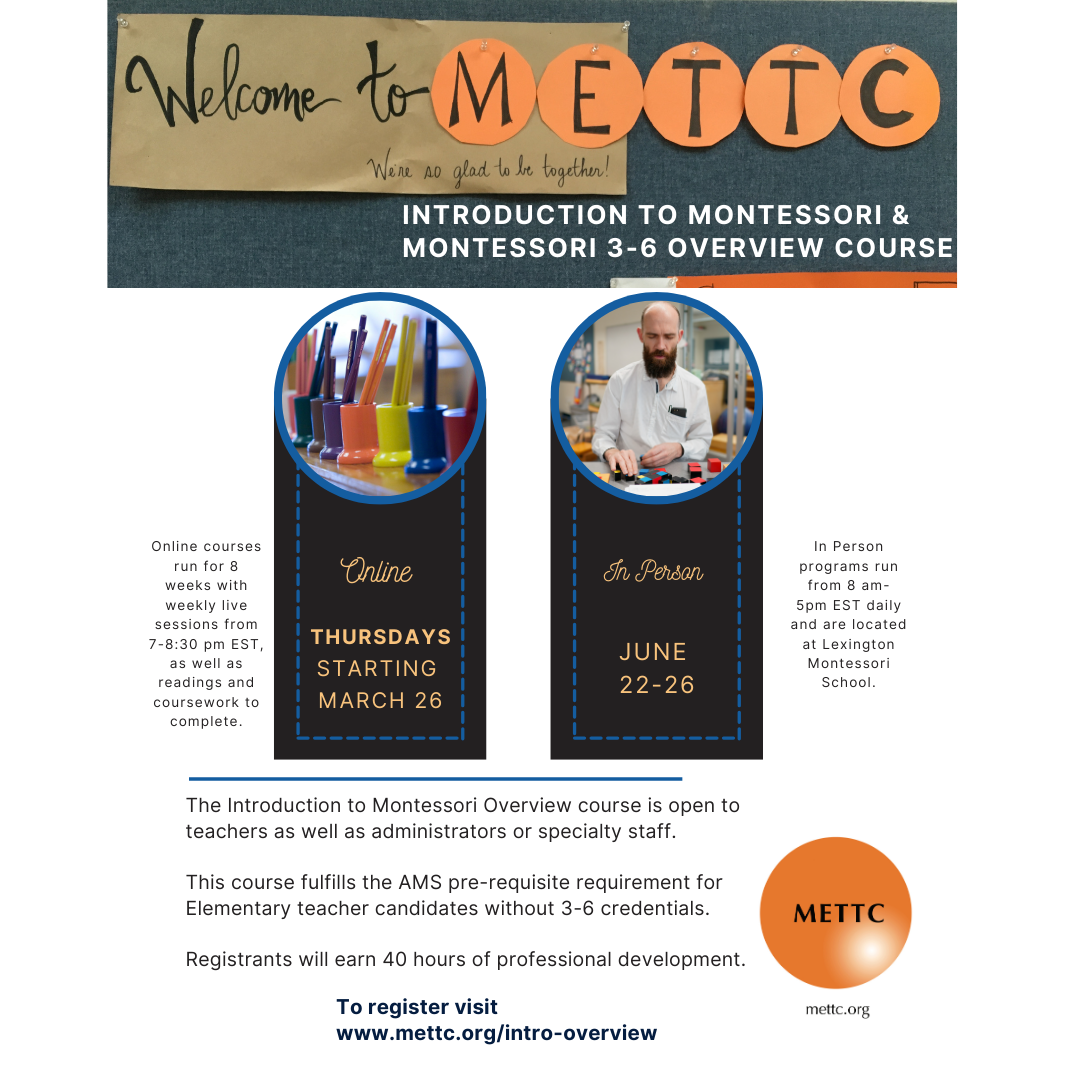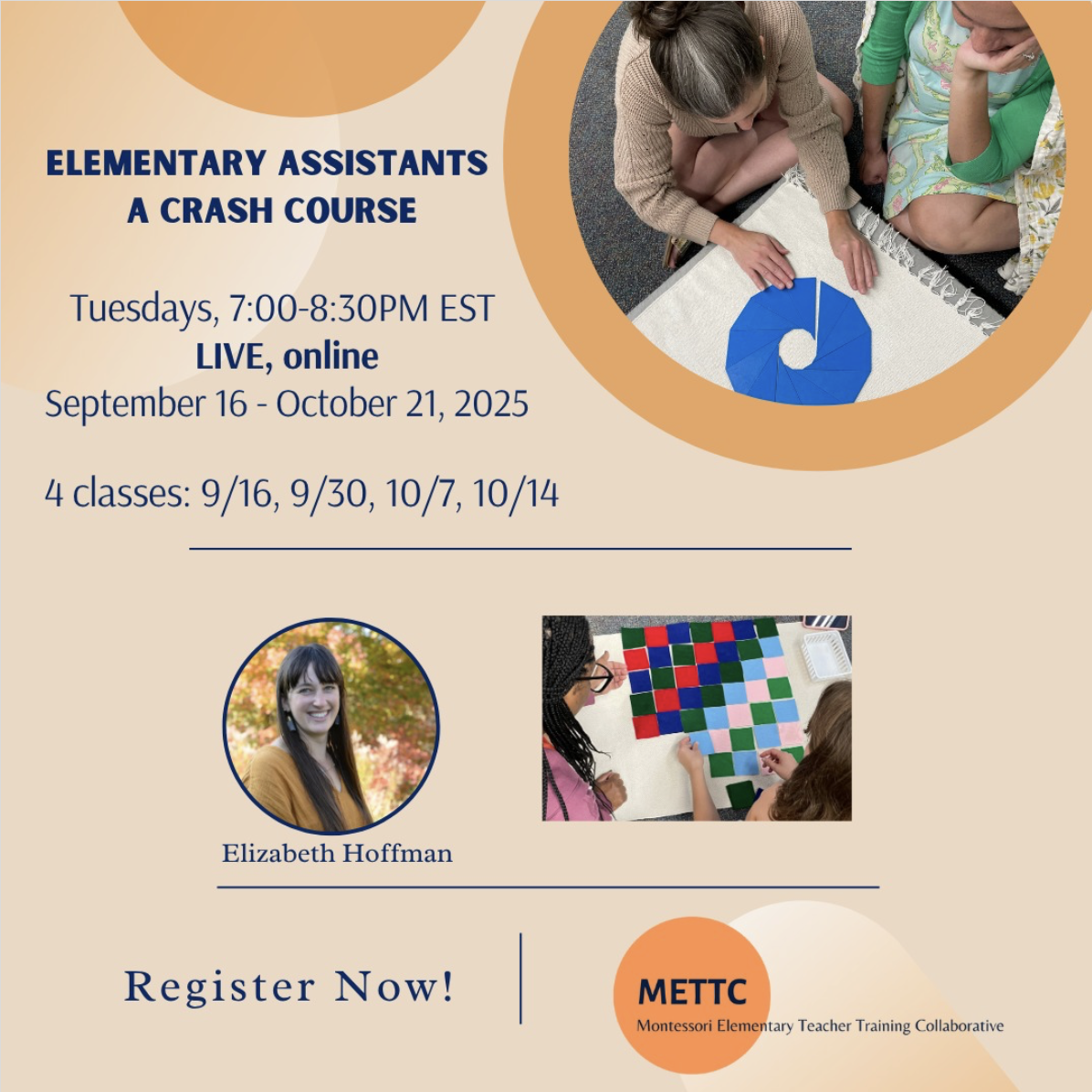Winter Workshop:
Live Zoom on Monday, February 23, 2026
Register below to join Biff Maier’s workshop on creating enaging and effective follow-up work!
After completing the registration form, please also submit payment using the PayPal link. You will receive a Zoom link for joining the live session the week before the presentation.
Following the presentation, you will also receive a Google Folder link with a recording of the session and certificate for 1.5 hrs of Continuing Professional Development.
Please contact workshops@mettc.org with any questions.
METTC Virtual Workshops for 2025-26
Click here to make payment via PayPal.me/MontessoriMETTC
Previous METTC Workshops (Register above for recordings.)
Fall Workshop 2025
Register above for a recording of Diana Traylor’s workshop on reinvigorating your observation practice!
After completing the registration form, please also submit payment using the PayPal link. You will receive a Google Folder link with a recording of the session and certificate for 1.5 hrs of Continuing Professional Development.
Please contact workshops@mettc.org with any questions.
Spring Workshop 2025
Register above for a recording of Hannah Army and Sharlow Hitchcock’s workshop on updating your Literature Circle practices!
After completing the registration form, please also submit payment using the PayPal link. You will then receive a Google Folder link with the recording and certificate for 1.5 hrs of Continuing Professional Development from the American Montessori Society.
Please contact workshops@mettc.org with any questions.
Fall Workshop 2024
Register above to receive a recording of Michael Duffy’s ZOOM workshop on the scientific story of the Birth of the Atom!
After completing the registration form, please also submit payment using the PayPal link. You will then receive a Google Folder link with the recording and certificate for 1.5 hrs of Continuing Professional Development from the American Montessori Society.
Please contact workshops@mettc.org with any questions.
Spring Workshop 2024
Register above to receive a recording of Michael Duffy’s ZOOM workshop on using Political and Economic Geography content to make our cultural curriculum relevant in the 21st century!
After completing the registration form, please also submit payment using the PayPal link. You will then receive a Google Folder link with the recording and certificate for 1.5 hrs of Continuing Professional Development from the American Montessori Society.
Please contact workshops@mettc.org with any questions.
Winter Workshop 2023
Register above to receive a recording of Michael Duffy’s ZOOM workshop on bringing our Cosmic Education presentations into the 21st century!
After completing the registration form, please also submit payment using the PayPal link. You will then receive a Google Folder link with the recording and certificate for 1.5 hrs of Continuing Professional Development from the American Montessori Society.
Please contact workshops@mettc.org with any questions!
Spring 2022
Register above to receive a recording of Dr. Vanessa M. Rigaud’s captivating online workshop: Cultural Intentionality in Our Montessori Prepared Environment.
This session focuses on the broad definition of social justice, and how it is an authentic core element of Montessori that must be emphasized with awareness and purpose in our Montessori prepared environments. Participants engage in hands-on experiences and dialogue to discover how to provide a valuable space for students to reflect on life experiences, examine observational instruments, learn how to capture the collective culture, and develop a method of practice that will transform education in the 21st century.
After completing the registration form, please also submit payment using the PayPal link. You will then receive a Google Folder link with the recording and certificate for 1.5 hrs of Continuing Professional Development from the American Montessori Society.
Please contact workshops@mettc.org with any questions!
Winter 2022
Register above to receive a recording of the ZOOM workshop in which Michael Duffy introduces METTC’s new Fundamental Human Needs materials!
After completing the registration form and submitting payment using the PayPal link, you will receive a Google folder link containing the recorded webinar, a certificate for 1.5 hrs of Continuing Professional Development from the American Montessori Society, and free access to these newly updated materials for use in your classroom.
Please contact workshops@mettc.org with any questions!
Introduction to Montessori and Early Childhood Overview course
This 3-6 Overview is a pre-requisite for anyone seeking Montessori Elementary I or II certification. Many schools and individuals have found it to be an excellent introduction for assistants, specialists, administrators, and non-teaching school staff. For more information and to apply, please link to here: https://mettc.org/intro-overview
METTC Elementary Assistant Training: A Crash Course
This program is designed to support new to Montessori, or new to Elementary, staff members working with Elementary aged children (6-12 years old). This course, offered online each Fall, is appropriate for classroom assistants, as well as specials teachers or before and aftercare staff.
In addition to building an understanding of Montessori pedagogy in the elementary environment, this 4-week course will help adults start their own toolbox of classroom management techniques and support healthy relationships in school through the lens of communication and professional excellence
Customized Professional Development Workshops
METTC faculty members are committed to offering professional development workshops so teachers can be more effective in their classrooms and children can receive the best possible Montessori education.
Are some of the classroom practices in your school out of sync with Montessori philosophy and pedagogy? Do some teachers avoid certain parts of the curriculum because they lack confidence in their knowledge or skills, or do they have gaps in their training? Those are the kind of issues these offerings are designed to address.
The cost of having such a workshop at your school can be negotiated when you contact us. You could decide on an intensive, interactive workshop exclusively for your school's teachers, or you could invite teachers from area schools to attend a seminar type format and charge a modest fee to participants to defray expenses.
To set-up a workshop or inquire about specific professional development courses, please send us your inquiry here.
We offer two kinds of programs:
Refresher courses that review the standard offerings of Montessori training, available from any of our faculty whose availability matches your timing needs.
Unique workshops developed by specific faculty members that go beyond the standard fare of Montessori training, again subject to availability of the presenters.
Refresher Workshops
METTC faculty members are available to review parts of the curriculum and / or Montessori philosophy and management. We encourage you to pick out areas that match the specific needs of your school, in any combination of units, and to favor depth over breadth.
6-12 - Philosophy / Management
Montessori's life, Montessori in America / Key Concepts/ Prep of the Teacher / Prep of the Environment / Observation/ Cosmic Education / Autonomous Learner / Planes of Development / Neurological Development / Montessori and Modern Theories / Special Education / Peace and Conflict Resolution / Community Building / Assessment and Record-Keeping / Relations with Parents, Parent Education, / Going Out, Big Trip / Curriculum Planning.
6-9 History
Concepts of time, parts of the year, months and days of the week, BC/AD (BCE/ CE) / Fundamental Human Needs / Clock of Eons, Timeline of Life
9-12 History
Human evolution / civilization studies / U.S. history
6-9 Biology
External parts / first knowledge / body functions / first classification
9-12 Biology (** see also VFP Day — details below)
Vital functions / advanced classification / human biology
6-9 Geography
Physical, political, economic geography / Creation and nature of elements/ Sun and Earth/ Composition of the Earth/ Work of Air / Work of Water
9-12 Geography
Maps and mapmaking / world political and economic geography
6-9 Science
Light, sound, and magnetism
9-12 Science
Evolutionary chemistry
6-9 Math
Golden beads, stamp game / bead frames, checkerboard /test tube division / memorization materials / money and measurement / multiples and factors / fraction and decimal numeration
9-12 Math
Fraction operations / decimal operations / squaring and square root / cubing and cube root /positive and negative numbers, number systems
6-9 Geometry
Basic concepts, lines, angles / polygons, triangles, quadrilaterals / congruency, similarity and equivalence / 2nd level constructive triangles
9-12 Geometry
Equivalence studies / area / volume / theorem of Pythagoras.
6-9 Language
Reading: traditional Montessori, shared reading, guided reading / literature based reading, comprehension, assessment and remediation / Writing: History of Writing, handwriting and spelling / Process Writing, expository writing / Grammar: function of words / sentence analysis
9-12 Language
Literature circles / writers' workshop, senior project / Grammar: advanced function of words, 2nd level sentence study / advanced verb study/ advanced sentence study
9-12 Vital Functions of Plants Day — TBA, July, 2026
Grow with us for this one-day (TBA) Elementary II Vital Functions of Plants session when we will explore the links and take a deep dive into the connections of Cosmic Education and the role of plants. Registration for this one-day workshop includes a digital album (teaching manual) and resources for impressionistic charts, as well as participation in hands-on, practical-life experiences in science experiments, gardening, and food prep. Faculty instructor, Joel Wilkinson, will lead the workshop, which is part of our Elementary II Montessori Teacher Credential program. The workshop is open to elementary and middle school teachers or assistants, with or without Montessori experience. Attend if you have been considering Montessori training and want to sample our programs but haven’t been able to commit for a full summer away; You may already be teaching Montessori and looking for a one-day refresher course; Or maybe you just want to know about the Cosmic Tasks of Plants!
Cost: $125. Pre-registration is required (details will be emailed upon receipt of paid registration). To register, email joel@mettc.org and include your summer phone number and contact information along with your email. Online payment option through METTC’s PayPal link: http://paypal.me/MontessoriMETTC
This one-day workshop is for professional development purposes only and is not affiliated with AMS or MACTE certification.
Adult learners interested in pursuing a Master’s degree have several options for applying their Montessori education work to a graduate degree. Check out these opportunities.
Unique Workshops
Biff Maier
Montessori and 21st Century Skills - We are living in a rapidly changing world filled with unprecedented problems and fantastic possibilities. As reformers scramble to define the mold-breaking, challenging, creative characteristics of a new education for children of the 21st century, Montessori offers a time-proven model that meets these priorities.
Alike and Different - Immerse yourself in comparisons and contrasts as we investigate Montessori materials and activities of all subject areas and all age groups. Discover “alike and different” as a fundamental concept of Montessori cosmic education and as a major multicultural tool in Montessori peace education. The workshop also explores how “likes attract” perpetuates bias, and how multicultural Montessori education confronts that bias.
I’m Bored - How many times have we heard a talented underachiever cry, “I’m bored!”? It can be hard to know how to respond. This workshop explores the causes of habitual boredom, how to avoid it, and strategies for resurrecting motivation, including inventive thinking, dynamic collaboration, and creative activities.
Boys Will Be Boys - Rambunctious and rebellious, boys can be challenging. In this workshop we explore the characteristics of boys, including the nature-nurture controversy regarding how they differ from girls. In light of the growing achievement gap between girls and boys, we discuss proven strategies that engage boys, and we reflect on prepared environments to see how to make them more “boy-friendly.”
Crash Course - This workshop provides strategies and materials to help teachers bring students lacking previous Montessori experience up to speed. New students and their parents must quickly embrace a culture of respect, autonomy, responsibility and independence. On-the-job training with a compelling orientation and purposeful practice enables the outliers to take their place in the community.
Homework - The workshop examines the goals of homework as well as the wisdom from recent research about its effectiveness. What do children gain, and at what cost? The presenter proposes guidelines and procedures for extending learning effectively beyond the classroom.
Self-Regulation - This workshop examines current psychological research on self regulation and its compatibility with Montessori’s vision of the normalized child. Montessori children build an authentic self with their teachers and community as mediators of their development. The result is autonomy, relatedness and competence. We will describe a prepared environment with tools for planning, goal setting, time management, behavior management, mindfulness and self-assessment.
Making It Stick - Learning is a journey children use to build their souls and to wire their minds. What do we most want them to see and to feel? What makes learning stick? This workshop offers the anatomy of effective lessons, including an analysis of the pedagogy of the Three Period Lesson. It offers strategies for the 1st Period, including getting (and keeping) attention, using “points of interest,” differentiating for various learners, as well as identifying, clarifying and reinforcing key concepts, for recall and application.
Whimsical Wisdom - Montessori envisioned schools where learning was so compelling that children would use it to build their souls. This workshop explores how to kindle students’ imaginations, stimulating their capacity for investigation and work. By examining the nature of children’s humor, participants will find playful, silly ways to effect serious, deliberate learning.
Diana Traylor
Sing for Joy - An experiential workshop showing how to use Circle Singing to release every child’s authentic, expressive self. The workshop will explore improvised group singing as it relates to Montessori pedagogy and inherent benefits of incorporating singing and other creative practices into the curriculum.
Passion-driven Learning through the Arts - When Montessori teachers and specialists work in concert, it's easy to integrate the arts into the Montessori Curriculum. When students make connections between what they learn in the specialist's environment and apply it in their classroom studies, they deepen connections to the curriculum and express themselves more fully.
Martha Torrence
Engaging Parents - Getting parents engaged in the school can go a long way toward ensuring the success of the school in its mission. This workshop offers a toolbox for building parent-school connections that last.
A Peace Table in the Staff Room - Our attempts to teach children peace education will have little impact if there is not an atmosphere of peace among the adults in their school. This workshop explores ways to develop and sustain a culture of collegiality in your school.
Michael and / or D'Neil Duffy
Cosmic Education and Big History - Cosmic Education is the connective tissue that binds together the subjects of the Montessori elementary curriculum. We explore the origins, nature, pedagogy, content and outcomes of this remarkable innovation and compare it to the university-based movement of Big History. Based in part on our book Children of the Universe.
Supporting Intrinsic Motivation in Montessori Students - Maria Montessori rejected extrinsic rewards and punishments, and modern research validates her position. What are the strategies we can learn from that research to encourage intrinsic motivation in our students? How can we apply those strategies to the follow up work we expect children to do in the various subject areas. Based in part on our book Love of Learning.
Michael Duffy
Montessori Math and the Developing Brain - The rationale for choosing Montessori materials over workbooks for learning math involves some psychological / developmental benefits, as well as some identifiable gains in brain development in our students. All this fits into Maria Montessori's goal of enhancing the child's mathematical mind. As an extra bonus, our math curriculum meets virtually every Common Core standard. Based in part on my book Math Works.
Birth of the Atom - In the context of Mario Montessori's Creation Story and creation stories from cultures around the world, we would be neglectful if we didn't present our students with a scientific version of the creation story as well. There are intriguing story elements contained in the birth of the first atom, 300,000 years after the Big Bang, and all that it has allowed to happen since then. The story provides the basis for a Timeline of the Early Universe that expands in the opposite directions of out other timelines, speeding up as it approaches the Big Bang.
Advanced World Political and Economic Geography - How do we extend the Montessori curriculum of world political and economic geography for lower elementary students into a more advanced version for upper elementary students, with a focus on the world we live in today? The political part involves the "unity in diversity" theme of Cosmic Education, while the economic part examines "interdependence" in today's version of the world economy.
Robyn Breiman
Peer Observation - What are the benefits of having teachers observe other teachers, particularly in building community within a school? This presentation will explore how to do these observations and the difference between peer observation, coaching and supervision.
Essential Elements - This workshop explores the essential elements of an authentic Montessori school based on rubrics developed by the NCMPS (National Center for Montessori in the Public Sector). For an already established school program, it's a chance to look at what areas to work on for improvement.
Geometry and Multiplication Memorization - The Montessori materials offer a wonderful opportunity to achieve dual objectives in areas that are sometimes challenging for elementary teachers. Not only do these two areas reinforce each other, but they give teachers an opportunity to save time in the delivery of curriculum buy achieving two objectives at once.
Seth Johnson
Looking for Leverage: A Systems-Thinking Approach to Classroom Leadership - “Systems thinking” is a transformational approach to learning, problem-solving and understanding the world used in many fields of study. Through this hands-on workshop, participants will learn how the perspectives and techniques of “systems thinkers” can be applied to our elementary classrooms. We will: 1) explore the 14 habits of a systems thinker; 2) identify systems thinking concepts already implicit within our Montessori environments & curriculum; and 3) learn how to use concrete tools from the field - such as causal loop diagrams, behavior-over-time graphs (BOTGs), the Systems Thinking Iceberg, and stock-flow maps - to visualize classroom dynamics, effectively address structural challenges, and explicitly teach systems thinking skills to enhance student learning. We will also identify how these concepts relate to DEIB/ABAR practices.
Cultivating Ecological Literacy in the Montessori Classroom - Montessori is ideal for cultivating the habits of mind, hand, and heart needed for environmental sustainability. Come learn mini-lessons, games, and songs to encourage “systems thinking” and learn how to reduce your school’s ecological footprint through student-led “green teams.” We’ll explore how to foster a love of nature through Goings Out, Pedagogy of Place, Earth Day celebrations, and cutting-edge ideas such as biomimicry and deep ecology.
Educating for Autonomy - Have you ever struggled with the “autonomy challenge”? Finding that perfect balance between freedom with responsibility? Come learn how to promote a “growth mindset” and self-regulation skills in service of autonomous learning. We will brainstorm common obstacles and share assessment tools you can use to conduct an “autonomy audit” to identify strengths and opportunities for growth within individual students and the class as a whole. You will leave with a deeper understanding of your classroom “system” and specific routines & rituals you can use to enhance student independence and motivation.
Building the Self: A Toolkit for Self-Regulation - Do your students ever struggle with finishing their work, managing their emotions, or maintaining friendships? We often assume these are issues of self-control, but research suggests they are actually related to a process called self-regulation. Self-reg is how we manage stress in all its forms - physical, cognitive, social-emotional, and prosocial. This workshop will offer tools, strategies, and mini-lessons you can use in your classroom right away to make this essential process concrete for yourself and your students. We will look at how it all connects and share a link to an online “Building the Self” Toolkit with free, downloadable resources. Bring a laptop or tablet, if possible, as well as your own interests and ideas around supporting students with the important process of self-creation.
Vanessa Rigaud
The Role of the Arts in the Montessori Curriculum - This workshop offers teachers an in-depth look at the role and importance of Art integration throughout the 6-12 Montessori curriculum. Participants will be able to engage in activities and dialogue about art education in the 21st century.
Authentic Assessment in the Classroom - This workshop offers teachers an examination of authentic tasks, rubrics, and standards for measuring and improving student learning within the Montessori curriculum. Authentic assessment captures the constructive nature of learning and provides multiple ways to gather evidence of learning.
Preparing Our Montessori Children for a Changing World - This workshop will help public/charter school teachers prepare children for the future without compromising the Montessori curriculum. Participants will experience the process of learning through collaboration, observation and investigative research in the cultural curriculum.


